Pipes for outdoor sewage: varieties, requirements, selection
The external sewage system is the excretory system of any city and even an average site with a small house. Therefore, outdoor sewage pipes are an integral part of the life-support complex of any settlement, and it is impossible to do without them. We will talk about the varieties and characteristics of this building material and help you understand the main differences in their parameters.
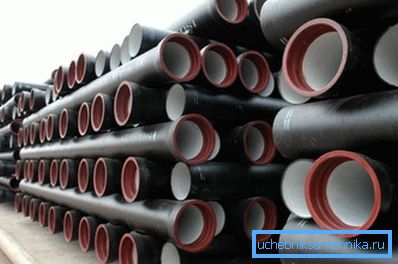
Species
Cast iron
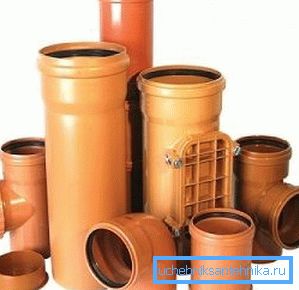
Cast iron products are most often used, as this is a durable and inexpensive material.
- Cast iron can withstand all kinds of wear characteristic of the underground method. - exposure to aggressive media, biological corrosion, soil pressure, etc.
- Most often used gray cast iron, covered with oil mastic for waterproofing. The installation method is usually bell-shaped.
- The advantages of this material are, in general, obvious: it is durable, durable, environmentally safe and reasonably priced..
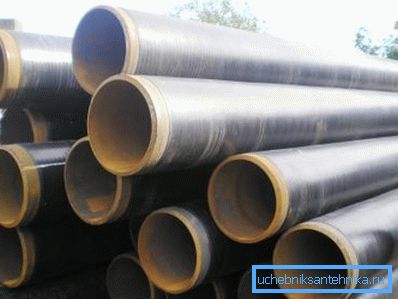
However, there are disadvantages:
- In case of violation of the insulation coating, cast iron, like any ferrous metal, undergoes electromechanical corrosion, which leads to its rapid deterioration and the need to be replaced;
- The material is very heavy, which imposes additional costs on its transportation from the manufacturer, as well as from the store to the consumer. This affects the final cost of the goods, installation also becomes more expensive and complicated;
- Laying the pipes with their own hands is excluded due to the weight of the products, so it is necessary to use special equipment, cranes and other machines;
- The material is afraid of water hammer due to its fragility and composition;
- When water freezes, the pipes may break or irreversibly deform.
Note! Despite all these features, cast iron pipe products have been and remain the most sought-after and tested when installing urban sewage systems.
Asbestos cement
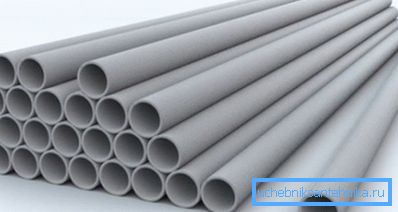
Asbestos cement is a quite suitable material for solving this problem: the composition is much lighter than cast iron, its price is low, it is durable and not subject to corrosion.
However, sewer pipes - sewer external pipes - should have one important quality, such as compressive strength from the outside, and asbestos refers to fragile materials and can be simply crushed by soil movement or high-load transport. This is his main drawback.
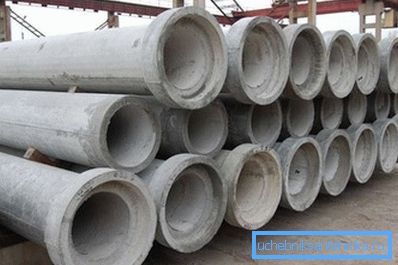
Also, the fragility leads to frequent chips and cracks during transportation and installation, which, of course, undesirable. At the same time, the material is quite easy to process, durable and does an excellent job with its tasks.
Ceramic
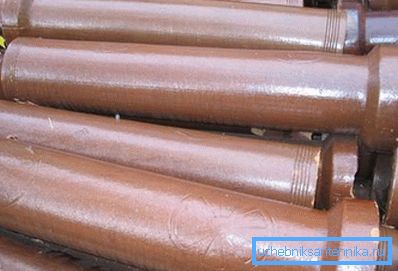
In general, ceramics has all the advantages of cast iron. However, there is a danger of damaging the ends of products during transportation, as is the case with asbestos cement.
Another unpleasant moment is the short length of parts, which complicates and slows down the installation.
Ceramic pipes are lighter than cast-iron analogs, but at the same time they are noticeably brittle, practically cannot be repaired and require careful sealing of numerous joints.

It is an absolutely safe material that can withstand high temperatures, pressure and aggressive working materials (liquids). It is not subject to corrosion and is able to serve for centuries, so a number of consumers choose this option, despite the complexity of the installation work and the listed dangers associated with the properties of ceramics.
Plastic
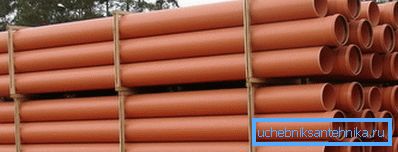
With the advent of new materials, serious changes have also affected sewer systems. The most commonly used polymer products, which showed remarkable results and are widely used for the installation of external sewer.
We will not conduct a lesson in the chemistry of high-molecular compounds, but only list the most popular and high-quality options:
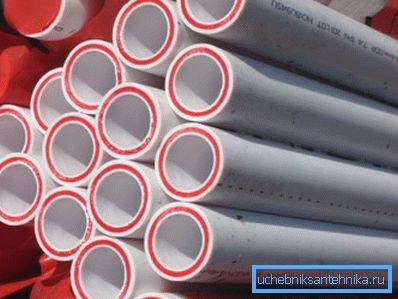
| Material | Special features | Benefits | disadvantages |
| Polyvinyl chloride | PVC sewer pipes for external sewage - this is one of the most durable and wear-resistant options, it is completely harmless and durable | Lightweight, easy installation, no internal build-up, resistance to corrosion and aggressive chemistry | Poorly withstands compression, afraid of overheating above 60 degrees |
| Polypropylene | These are elastic pipes that are used for the installation of pressure-free systems. | Low weight, resistance to mechanical stress, elasticity, resistance to aggressive chemicals | Reasonably high cost, complicated installation |
| Polyethylene | Polyethylene is an absolutely harmless material that we use every day and everywhere. | Simple installation, no special equipment required, durability, resistance to frost and temperature extremes | Poorly withstands heating above 60 degrees, although it is able to skip boiling water for a short time. |
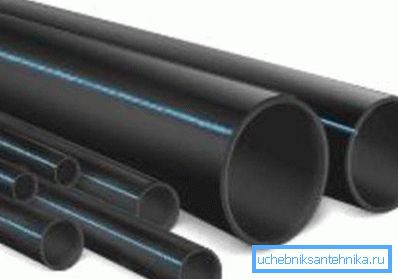
Note! Unlike steel and cast iron, polymer products, because of their elasticity, are not so much afraid of water hammer and freezing of water inside the pipe.
Conclusion
The external sewage system is no less important an element of the municipal economy than the housing stock or transport, since its failure to function can paralyze the life of the whole district. That is why sewage pipes for external sewage should be selected and installed with special care, as shown in the video in this article.